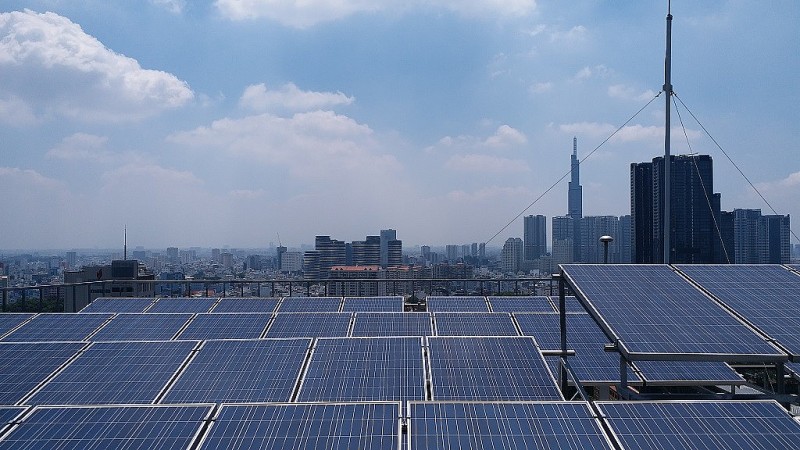Vietnam - Germany join hands to develop sustainable energy
Thứ tư, 13/10/2021 - 17:40
Over the years, Vietnam has shown a strong determination in exploiting and using renewable energy with a long-term vision of a sustainable energy transition.
Not only has the participation of all ministries, departments and branches nationwide, the support and cooperation from the international community has contributed to helping Vietnam step by step fulfill its commitments. In particular, the support from the German government has contributed significantly to the success of the development of renewable energy in Vietnam.

Rooftop solar photovoltaic system. (Source: GIZ Vietnam)
In the past 10 years, cooperation in the field of sustainable energy has always been one of the priority areas in the relationship between Vietnam and Germany. Germany is currently one of the largest sponsors to Vietnam in this field, and has ranked Vietnam as a "Global Partner Country" within the framework of the new strategy on development cooperation of the German Government.
Since 2009, the German Development Cooperation Organization (GIZ) has supported the Government of Vietnam in achieving its goals of promoting renewable energy, energy efficiency and smart grids. Cooperation between Vietnam and Germany in wind energy development began in 2009, which resulted in the issuance of the first wind power tariff by the Government of Vietnam in 2011.
GIZ Energy Support Program (abbreviated as GIZ ESP) with strategic partners is the Ministry of Industry and Trade, the Electricity and Renewable Energy Agency (EREA), the Electricity Regulatory Authority (ERAV), the National Assembly (NA) , Electricity of Vietnam (EVN) and the Central Economic Commission (CEC); the main sponsors are the German Ministry of Economic Cooperation and Development (BMZ), the German Ministry of Environment, Nature Conservation and Nuclear Safety (BMU), the German Ministry of Economic Affairs and Energy (BMWi) and the German Ministry of Education and Research (BMBF), have been carrying out a series of policy consulting, capacity building and technology cooperation projects in renewable energy, energy efficiency, smart grids, bio-energy, wind power and solar power integration in agriculture.
The goal of ESP is to contribute to the implementation of Vietnam's GHG emission reduction and green growth strategy, by strengthening the policy framework for renewable energy development and energy efficiency to promote private investment, and improve the professional and managerial capacities of organizations and stakeholders.
The ESP program has supported many research activities, consulted and proposed to the Government of Vietnam incentive mechanisms to promote sustainable energy transition; capacity building for investors, consulting firms, commercial banks, universities, research institutes, local and central officials; supporting investors and strengthening the preconditions of the legal and regulatory framework.
At the same time, the Program has also conducted technical and financial training courses for public and private sector staff. Over 12 years of implementation, the ESP Program has provided financial support to carry out 174 technical studies with the participation of many senior experts in Vietnam and around the world, including 55 research studies supporting the policymaking process of Vietnamese partners such as studies providing theoretical basis, practical experience of other countries on the FIT pricing mechanism for wind power, solar power, biomass power, database of national energy information system, energy efficiency program, grid standards and many other mechanisms and policies.
In addition, the program also been organized with nearly 100 seminars of different sizes with about 9,000 participants, including representatives from central and local state management agencies, businesses, credit institutions as well as domestic experts. The program has also organized 49 intensive training courses at home and abroad for nearly 2,400 visits of Vietnamese students in various fields such as wind power, biomass, smart grid...
With its activities, the ESP program has contributed to promoting the supply of electricity from clean energy to more than 540,000 people in Vietnam, increasing private investment in clean energy with a total investment capital of more than 112 million USD, contributing to reducing CO2 emissions in Vietnam with the reduction of nearly 3.5 million tons of CO2 per year.
In the coming time, the ESP Program will continue to implement projects on developing rooftop solar power in industry and commerce, developing sustainable biological markets, integrating aquaculture and solar energy, renewable energy and energy efficiency… to support the development of a legal framework for energy transition with a long-term vision as well as capacity building for stakeholders to help Vietnam complete Sustainable Development Goals, especially fulfilling international commitments such as the United Nations Framework Convention on Climate Change (UNFCCC) and the Paris Agreement.
Ha Tran
